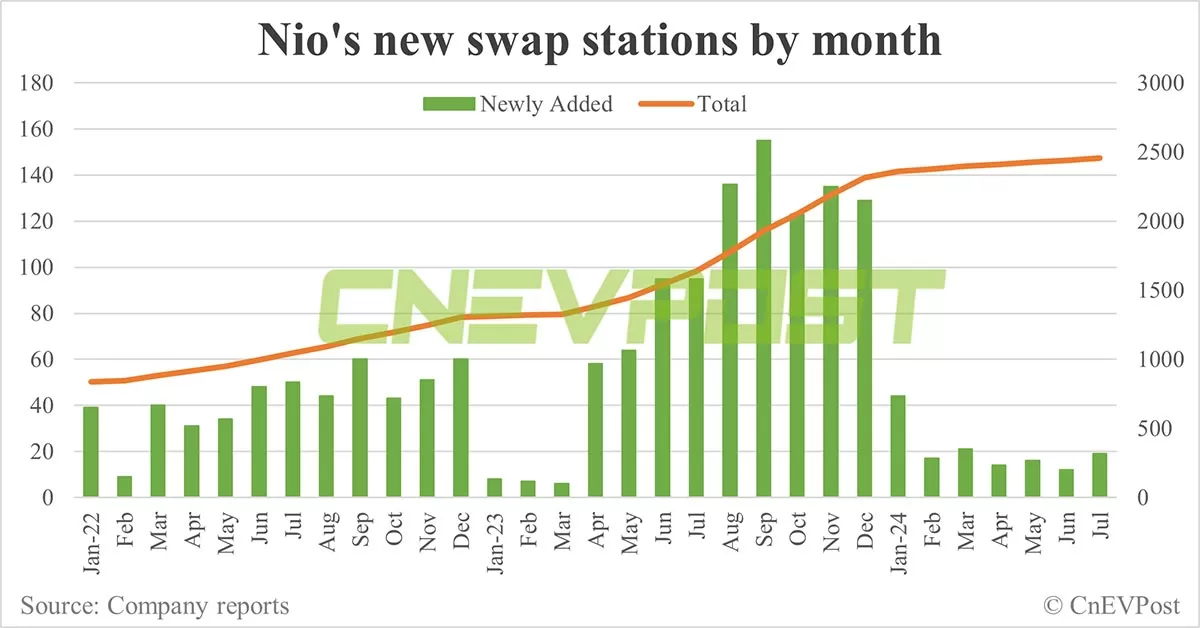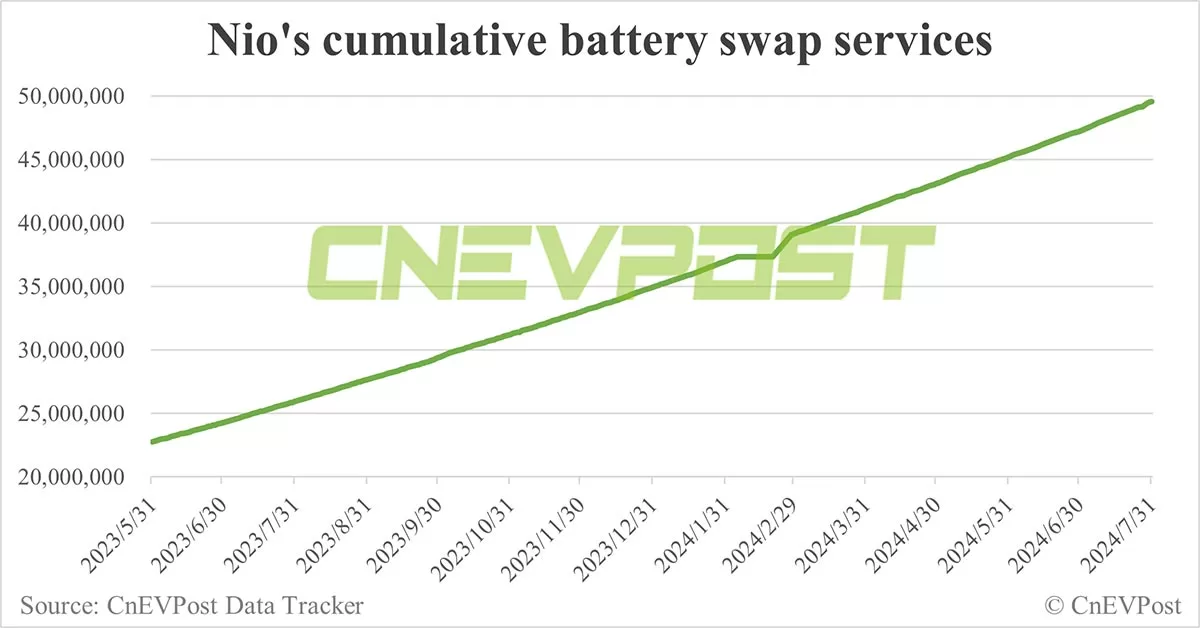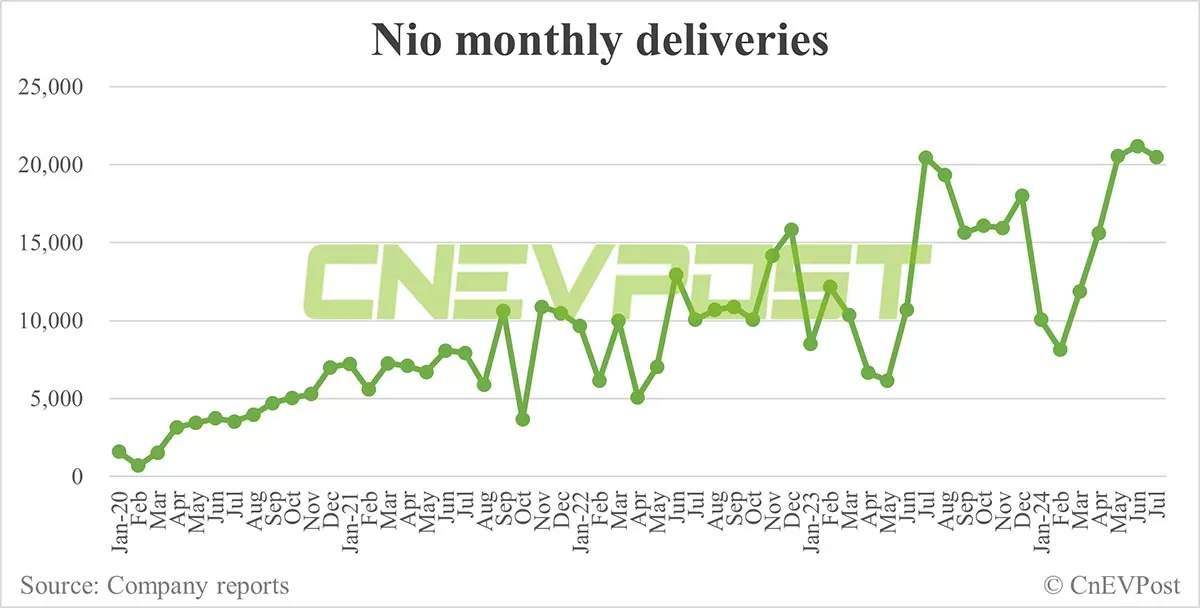By the end of July, Nio had accumulated about 49.6 million battery swap services. It is on track to reach its 50 millionth service milestone on August 5-6.

Nio (NYSE: NIO) added fewer than 20 battery swap stations last month, as construction has remained slow so far this year. Its battery swap service is on track to reach its 50 millionth milestone early next week.
The electric vehicle (EV) added 19 battery swap stations in China in July, bringing the number of the facility to 2,458 at the end of the month, according to an infrastructure construction report it released today.
That's the lowest July number of battery swap stations added by Nio since CnEVPost began daily monitoring in August 2021. It added 50 and 95 battery swap stations in July 2022 and July 2023 respectively.
Typically, Nio's pace of building battery swap stations is relatively slow in the initial months of the year and starts picking up in the middle of the year.
So far this year, Nio seems to have broken its previous practice by adding less than 20 battery swap stations in all months except for 44 in January and 21 in March.
Nio unveiled its fourth-generation battery swap station at its last Nio Day event on December 23, 2023, and announced a target of adding 1,000 stations by 2024 in China. It reached its goal of adding 1,000 stations in 2023.
The company only put the first fourth-generation battery swap stations into service on June 13, and the new generation of stations supports service for multi-brand models with different battery pack sizes.
Speaking at a vehicle owner meetup event on July 24, Nio founder, chairman, and CEO William Li said the company was still working toward its goal of adding 1,000 new battery swap stations within the year, and has not yet given up on that goal.
If any setbacks may occur, there could be a delay of up to 1-2 months in reaching the target, Li said at the time.
Nio has set up a project to build a new battery swap station assembly plant in Wuhan, Hubei province, which is expected to start production in September, Li said.
Once the Wuhan plant is completed, Nio will have three battery swap station assembly plants, with the other two in Kunshan, Jiangsu province, and Hefei, Anhui province, he said.
By the end of July, Nio had provided about 49.6 million battery swap services. Its 50 millionth battery swap service milestone is expected to be reached on August 5-6.
Of the 19 battery swap stations added by Nio in July, 14 are located along highways.
At the end of July, the company had 820 battery swap stations along highways in China.
Nio's battery swap stations provided 2,299,707 services in July, an average of 74,184 per day, up 7.71 percent from 68,876 in June.
On average, each Nio vehicle carried out around four battery swaps in July.
Battery swap stations are the main source of power received by Nio vehicles. Of the power replenished by Nio vehicles in July, 53.2 percent came from these stations, 22.7 percent from home chargers, 19.6 percent from third-party public chargers, and 4.5 percent from Nio's public chargers.
The company added 162 new charging piles in July, including superchargers and slower-charging destination chargers.
At the end of July, Nio had 3,925 charging stations in China, offering 22,917 chargers.
Nio's chargers provided 2,266,470 charging services in July, with nearly 80 percent of the orders serving non-Nio vehicles, according to the company.
Nio provided 20,606 battery upgrades to customers in July. It allows owners to upgrade their battery packs on a daily, monthly, annual or permanent basis.
The company delivered 20,498 vehicles in July, marking the third consecutive month over the 20,000-vehicle mark, putting cumulative deliveries since inception at 557,518 vehicles.

